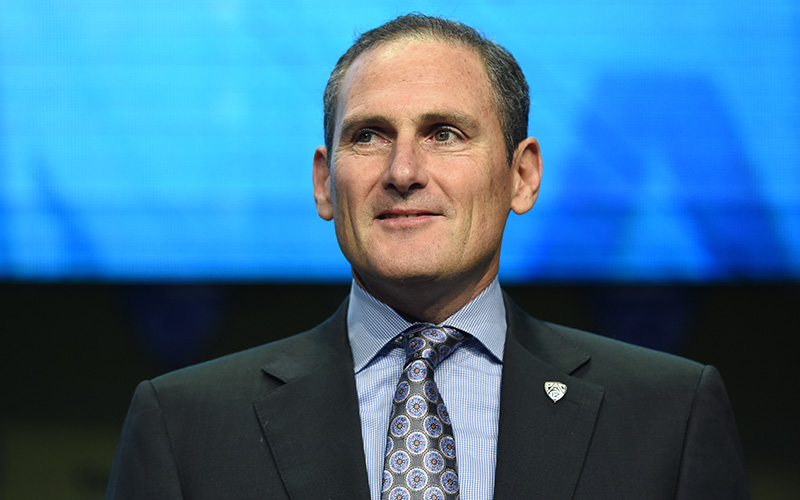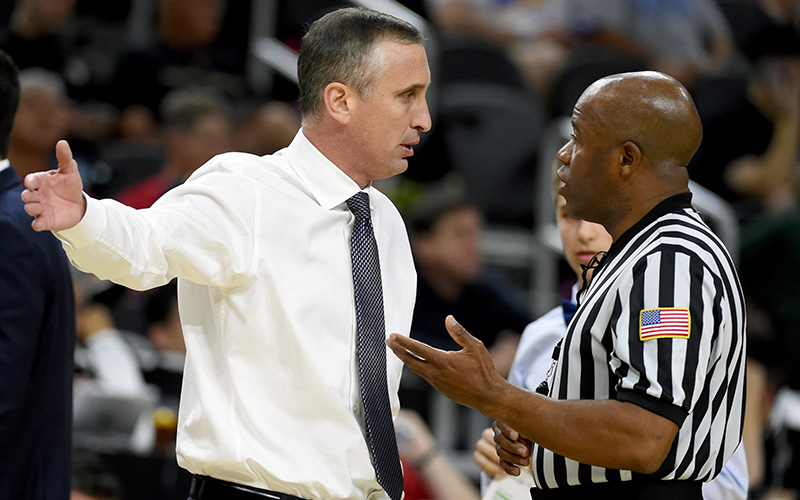LAS VEGAS – At a time when basketball fans were anticipating “One Shining Moment,” the NCAA announced in one defining moment March 12 that there will be no NCAA Tournament this season.
Instead, the COVID-19 pandemic threw a stop sign up on the road to the Final Four of men’s and women’s basketball. Games were scheduled to begin Thursday.
At the same time, conference basketball tournaments already underway were suspended, including the Pac-12 Conference men’s and women’s tournaments in Vegas.
But that somber news didn’t arrive before Pac-12 Commissioner Larry Scott had a chance to defend the conference’s controversial officiating and changes that have been implemented during a roundtable interview session at the Pac-12 women’s event.
During the 2019-20 men’s basketball season, Utah coach Larry Krystowiak, UCLA coach Mick Cronin and Washington State coach Kyle Smith were reprimanded by the conference for criticizing the referees.
In women’s basketball, the Pac-12 reprimanded Oregon State coach Scott Rueck for comments he made in February about the referees.
Despite frustrations among coaches, Scott believes basketball officiating in the conference this season has been good. And thinks he has the right people in charge.
“I’m very pleased with both of the programs and our leadership,” Scott said. “Bobby Dibler on the men’s and Violet Palmer on the women’s. I think that we’re fortunate to have very, very high caliber leadership and very good, quality officials. It’s far from perfect … but I think generally, our conference stacks up very well compared to our peers in both those.”
Arizona women’s basketball coach Adia Barnes agreed with Scott.
“I think, overall, the conference is doing well,” Barnes said. “I think as a coach and you’re a competitor you always hate the calls. It’s just human nature I think and I think it’s a really hard (topic). I think we have some of the best in the country. I think we’re way ahead of other conferences.”
The opinions of Barnes and Scott seemed to differ from those of fans attending the women’s basketball tournament, who directed numerous insults at the referees.
Brian Kindred, a longtime Oregon fan, had some strong words about Pac-12 officiating.
“I watch other conferences and their refs call better fouls,” Kindred said. “They’re just more consistent.”
And Bill Reese, father of Arizona star Cate Reese, agreed.
“I think they favor the crowd,” he said from his seat as the Wildcats lost to Oregon in the tournament semifinals.
Questions about the quality of officiating in Pac-12 basketball pale in comparison to the conference’s football referees.
For example, controversy arose when Yahoo reported that a 2018 review of a targeting call against Washington State linebacker Logan Tago against Southern California quarterback JT Daniels was deemed to not be targeting by an untrained third party. The officiating crew on the field and in the conference replay center deemed the call to be roughing the passer and targeting but they were overruled on targeting, reportedly by a league vice-president of business affairs.
In 2019, an Arizona State player jumped over the line to disrupt a field goal attempt in an ASU game against Michigan State. The Pac-12 later admitted there should have been a call for leaping on the play, which would have resulted in a 15-yard penalty and an automatic first down for the Spartans.
An independent football officiating review in July of 2019 made several recommendations and in August the Pac-12 announced several changes, including a new communication protocol to establish more transparency about controversial calls.
The rules, which were adopted before the 2019 season, require a statement from the league on game-ending calls or no-calls impacting the results of games, calls involving a major error in officiating mechanics, calls involving errors in rules interpretations, and other circumstances where clarification is necessary.
The Pac-12 also established a “Centralized Replay Manual.” It makes the supervisor of replay officials the ultimate decision maker on replayed calls – eliminating the possibility of another USC-Washington State situation.
“I think it was a very good year in football officiating for the conference, certainly compared to the prior year for a variety of reasons.” Scott said at the roundtable session with media members during the Pac-12 women’s tournament. “And some real improvements have been made.”
Pac-12 conference referees officiated the College Football Playoff National Championship game in January and, according to Scott, they did well.
“It’s the highest profile stage,” Scott said. “There’s a lot of attention. There’s more TV cameras in super slow (motion) on every play. I think there was even a ref cam or ref channel this year, with former referees critiquing the officials. But our crew did an excellent job … we got excellent feedback in terms of how our crew did.”


